Posted on April 24, 2014 by The Orwell Prize -
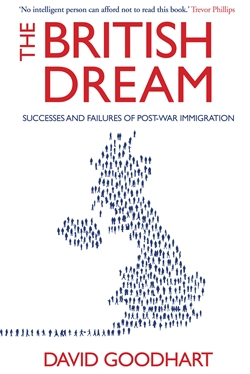
In The British Dream, David Goodhart tells the story of post-war immigration and charts a course for its future. Drawing on hundreds of interviews with people from all over the country and a wealth of statistical evidence, he paints a striking picture of how Britain has been transformed by immigration and examines the progress of its ethnic minorities – projected to be around 25 per cent of the population by the early 2020s. Britain today is a more open society for minorities than ever before, but it is also a more fragmented one. Goodhart argues that an overzealous multiculturalism has exacerbated this problem by reinforcing difference instead of promoting a common life. The multi-ethnic success of Team GB at the 2012 Olympics and a taste for chicken tikka masala are not, he suggests, sufficient to forge common bonds; Britain needs a political culture of integration. Goodhart concludes that if Britain is to avoid a narrowing of the public realm and sharply segregated cities, as in many parts of the US, its politicians and opinion leaders must do two things. Firstly, as advocated by the centre right, they need to bring immigration down to more moderate and sustainable levels. Secondly, as advocated by the centre left, they need to shape a progressive national story about openness and opportunity – one that captures how people of different traditions are coming together to make the British dream. Taken from Atlantic
Posted on April 24, 2014 by The Orwell Prize -

Not For Turning is the first volume of Charles Moore’s authorized biography of Margaret Thatcher, the longest serving Prime Minister of the twentieth century and one of the most influential political figures of the postwar era. Charles Moore’s biography of Margaret Thatcher, published after her death on 8 April 2013, immediately supercedes all earlier books written about her. At the moment when she becomes a historical figure, this book also makes her into a three dimensional one for the first time. It gives unparalleled insight into her early life and formation, especially through her extensive correspondence with her sister, which Moore is the first author to draw on. It recreates brilliantly the atmosphere of British politics as she was making her way, and takes her up to what was arguably the zenith of her power, victory in the Falklands. (This volume ends with the Falklands Dinner in Downing Street in November 1982.) Moore is clearly an admirer of his subject, but he does not shy away from criticising her or identifying weaknesses and mistakes where he feels it is justified. Based on unrestricted access to all Lady Thatcher’s papers, unpublished interviews with her and all her major colleagues, this is the indispensable, fully rounded portrait of a towering figure of our times. Taken from Penguin
Posted on March 26, 2014 by The Orwell Prize -

AA Gill is a writer and critic for the Sunday Times and Vanity Fair.
Submitted articles
Welcome to death island – The Sunday Times Magazine, 08/12/2013 ‘My family name means I had to go through a lot’ – The Sunday Times Magazine, 17/11/2013 Yet another one for the road – The Sunday Times Magazine, 29/12/2013 Long day’s journey into the night – The Sunday Times Magazine, 31/03/2013 AA Gill on twitter
Posted on March 26, 2014 by The Orwell Prize -
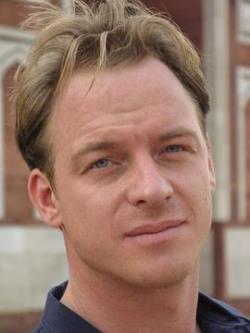
James Astill is Political editor and Bagehot columnist of the Economist. He has previously worked as International Security editor, South Asia correspondent, and Energy and Environment editor for the Economist.
Articles submitted
Bagehot: The Weirdness of Eastleigh – The Economist, 23/02/2013 Bagehot: The Parable of the Clyde – The Economist, 31/08/2013 Bagehot: The New Islamophobes – The Economist, 19/10/2013 Bagehot: More Tough, Less Love – The Economist, 02/11/2013 Bagehot: Top of the Class – The Economist, 07/12/2013 Cockney Funerals: Buried Like Kings – The Economist, 21/12/2013
Posted on March 26, 2014 by The Orwell Prize -
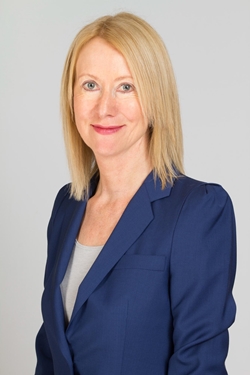
Mary Riddell is a columnist for Daily Telegraph. A former deputy editor of Today, she has written for a number of national newspapers, including The Observer, on social, constitutional and foreign affairs, as well as covering criminal justice and Westminster politics. Her writing awards include Interviewer of the Year in the British Press Awards and a commendation in the feature-writing category. She has twice been named legal journalist of the year by the Bar Council and has previously been shortlisted for the Orwell Prize for Journalism (2008).
Submitted articles
Titanium Ed And The Iron Lady – Daily Telegaph, 16/04/2013 Is Ed Miliband caught in a trap on Syria? – Daily Telegraph, 18/06/2013 The NHS is not a creaking relic – Daily Telegraph, 16/07/2013 The housing crisis needs new towns – Daily Telegraph, 15/10/2013 The silent majority and immigration – Daily Telegraph, 12/10/2013 What Obama’s deal with Iran can teach us – Daily Telegraph, 26/11/2013
Posted on March 26, 2014 by The Orwell Prize -

Gideon Rachman became chief foreign affairs columnist for the Financial Times in July 2006. He joined the FT after a 15-year career at The Economist, which included spells as a foreign correspondent in Brussels, Washington and Bangkok. He also edited The Economist’s business and Asia sections. His particular interests include American foreign policy, the European Union and globalisation. He is the author of Zero-Sum World, published by Atlantic Books in November 2010. He was shortlisted for the Orwell Prize for journalism in 2011.
Submitted articles
America cannot live so carelessly forever – Financial times, 07/10/2013 Staying out of Syria is the bolder call for Obama – Financial Times, 13/05/2013 The Chinese dream is Smothered by Toxic Fog – Financial Times, 06/05/2013 Germany is a vegetarian in a world full of carnivores – Financial Times, 09/09/2013 Why I switched sides in the UK’s civil war over Europe – Financial Times, 20/05/2013 The Shadow of 1914 falls over the Pacific – Financial Times, 06/02/2013 Gideon Rachman on Twitter
Posted on March 26, 2014 by The Orwell Prize -

Jonathan Freedland is a columnist at the Guardian. He also regularly writes for the New York Review of Books and the Jewish Chronicle. He also presents ‘The Long View’ on Radio 4, and writes novels under the pseudonym Sam Bourne. He was shortlisted for the Orwell Prize for journalism in 2007.
Submitted Articles
Marking Margaret Thatcher’s passing: a battle over Britain’s present and future – The Guardian, 09/04/2013 Antisemitism doesn’t always come doing a Hitler salute – The Guardian, 04/10/2013 Why even atheists should be praying for Pope Francis – The Guardian, 15/11/2013 Woolwich attack: When killers strike, should we listen to what they say? – The Guardian, 24/05/2013 In Britain today rules, like taxes, are for the little people – The Guardian, 12/07/2013 The Unknown Maggie – The New York Review of Books, 26/09/2013
Posted on March 26, 2014 by The Orwell Prize -

To follow.
Posted on March 20, 2013 by The Orwell Prize -

At fourteen, Richard Holloway left his home in the Vale of Leven, north of Glasgow, and travelled hundreds of miles to be educated and trained for the priesthood by a religious order in an English monastery. By twenty-five he had been ordained and was working in the slums of Glasgow. Throughout the following forty years, Richard touched the lives of many people in the Church and in the wider community. But behind his confident public face lay a restless, unquiet heart and a constantly searching mind. Why is the Church, which claims to be the instrument of God’s love, so prone to cruelty and condemnation? And how can a man live with the tension between public faith and private doubt? In his long-awaited memoir, Richard seeks to answer these questions and to explain how, after many crises of faith, he finally and painfully left the Church. It is a wise, poetic and fiercely honest book. Taken from Canongate
Posted on March 20, 2013 by The Orwell Prize -

Christina Patterson is a writer, broadcaster and columnist. She writes about politics, society, culture, books and the arts. She has interviewed writers and artists ranging from Martin Amis to Eddie Izzard and Werner Herzog, and did the first interview after he left office with Gordon Brown. A former director of the Poetry Society, and literary programmer at the Southbank Centre, she has written for the Observer, the Sunday Times, the Guardian, Time, the Spectator and the New Statesman. She’s a regular commentator on radio and TV news programmes, a regular reviewer on the Sky News press preview, and a regularguest on cultural programmes including BBC 2′s The Review Show. She has also campaigned to improve standards in nursing in a series of articles in The Independent, by speaking at conferences, and in programmes she has made, including a documentary for Radio 4 and a film for The One Show. After 10 years on the staff of The Independent, she is now freelance.
Submitted articles
The nurses who taught an ailing hospital how to care A crisis in nursing: Six operations, six stays in hospital – and six first-hand experiences of the care that doesn’t care enough More nurses, better paid than ever – so why are standards going down? How can a profession whose raison d’être is caring attract so much criticism for its perceived callousness? Does nursing need to be managed differently? Or is the answer to develop a new culture of compassion? Reforms in the 1990s were supposed to make nursing care better. Instead, there’s a widely shared sense that this was how today’s compassion deficit began. How did we come to this? Anne Milton: ‘We need to raise the bar’
Other links
Christina Patterson on Twitter Christina Patterson on Journalisted
Posted on March 20, 2013 by The Orwell Prize -

Andrew Norfolk is The Times journalist instrumental in breaking the Rotherham grooming scandal. He recently won the Paul Foot Award for investigative journalism.
Submitted articles
Other links
Posted on March 20, 2013 by The Orwell Prize -
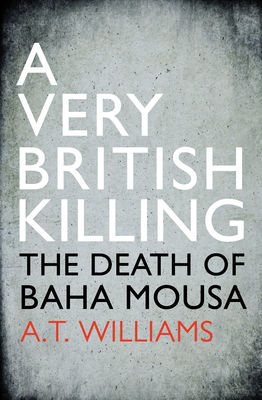
On 15 September 2003 Baha Mousa, a hotel receptionist, was killed by British Army troops in Iraq. He had been arrested the previous day in Basra and was taken to a military base for questioning. For forty-eight hours he and nine other innocent civilians had their heads encased in sandbags and their wrists bound by plastic handcuffs and had been kicked and punched with sustained cruelty.
A succession of guards and casual army visitors took pleasure in beating the Iraqis, humiliating them, forcing them into stress positions in temperatures up to 50 degrees Centigrade, and watching them suffer in the dirty concrete building where they were held. Other soldiers, officers, medics, the padre, did not take part in the violence but they saw what was happening and did nothing to stop it. Some knew it was wrong. Some weren’t sure. Some were too scared to intervene. But none said anything or enough until it was far too late and Baha Mousa had been beaten to death.
This book tells the inside story of these crimes and their aftermath. It examines the institutional brutality, the bureaucratic apathy, the flawed military police inquiry and the farcical court martial that attempted to hold people criminally responsible. Even though a full public inquiry reported its findings into the crimes in September 2011, its mandate restricted what it could say. The full story, told with the power of a true-crime expose or court-room drama, shows how this was not simply about a few bad men or ‘rotten apples’. It shines a light on all those involved in the crime and its investigation, from the lowest squaddie to the elite of the army and politicians in Cabinet. What it reveals is devastating.
Taken from Random House
Posted on March 20, 2013 by The Orwell Prize -
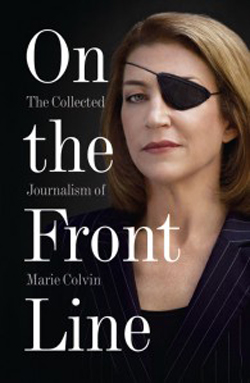
A fearless, passionate veteran reporter of conflicts from around the world, Sunday Times journalist Marie Colvin was killed in February 2012, covering the uprising in Syria from the besieged city of Homs. On the Front Line is a collection of her finest work, a portion of the proceeds from which will go to the Marie Colvin Memorial Fund. Marie Colvin held a profound belief in the pursuit of truth, and the courage and humanity of her work was deeply admired. On the Front Line includes her various interviews with Yasser Arafat and Colonel Gadaffi; reports from East Timor in 1999 where she shamed the UN into protecting its refugees; accounts of her terrifying escape from the Russian army in Chechnya; and reports from the strongholds of the Sri Lankan Tamil Tigers where she was hit by shrapnel, leaving her blind in one eye. Typically, however, her new eye-patch only reinforced Colvin’s sense of humour and selfless conviction. She returned quickly to the front line, reporting on 9/11, Afghanistan, Iraq, Gaza and, lately, the Arab Spring. Immediate and compelling, On the Front Line is a street-view of the historic events that have shaped the last 25 years, from an award-winning foreign correspondent and the outstanding journalist of her generation. Taken from HarperCollins
Posted on March 20, 2013 by The Orwell Prize -

It is often the smallest details of daily life that tell us the most. And so it is under occupation in Palestine. What most of us take for granted has to be carefully thought about and planned for: When will the post be allowed to get through? Will there be enough water for the bath tonight? How shall I get rid of the rubbish collecting outside? How much time should I allow for the journey to visit my cousin, going through checkpoints? And big questions too: Is working with left-wing Israelis collaborating or not? What affect will the Arab Spring have on the future of Palestine? What can anyone do to bring about change? Are any of life’s pleasures untouched by politics? Taken from Profile Books
Posted on March 20, 2013 by The Orwell Prize -
Posted on March 20, 2013 by The Orwell Prize -

One quiet day when her mother was away from home, Carmen Bugan’s father put on his best suit and drove into Bucharest to stage a one-man protest against Ceauşescu. He had been typing pamphlets on an illegal typewriter and burying it in the garden each morning under his daughter’s bedroom window. This is the story of what happened to Carmen and her family, isolated and under surveillance in their beloved village home. It is an intimate piece of our recent history, the testimony of an extraordinary childhood left abruptly behind. Above all, it is a luminous, compassionate, and unflinchingly honest book about the price of courage, the pain of exile, and the power of memory.
Posted on March 20, 2013 by The Orwell Prize -
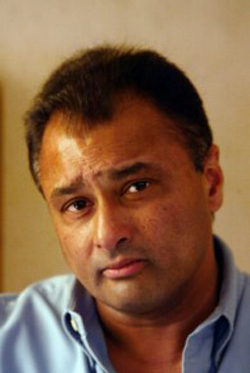
Kim Sengupta is the Defence and Diplomatic Correspondent of The Independent. He covers international and domestic news and his extensive reporting from around the world has included many of the major conflicts in recent times.
Submitted articles
Other links
Kim Sengupta on Journalisted
Posted on March 20, 2013 by The Orwell Prize -
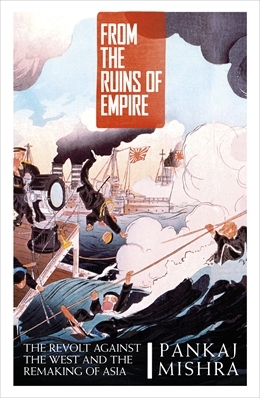
Viewed in the West as a time of self-confident progress, the Victorian period was experienced by Asians as a catastrophe. As the British gunned down the last heirs to the Mughal Empire or burned down the Summer Palace in Beijing, it was clear that for Asia to recover, a new way of thinking was needed. Pankaj Mishra re-tells the history of the past two centuries, showing how a remarkable, disparate group of thinkers, journalists, radicals and charismatics emerged from the ruins of empire to create an unstoppable Asian renaissance, one whose ideas lie behind everything from the Chinese Communist Party to the Muslim Brotherhood, and have made our world what it is today. Taken from Penguin

















